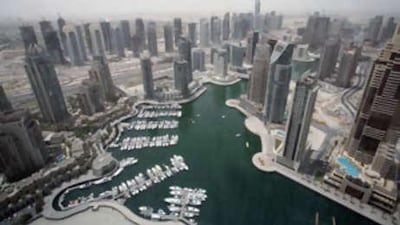A dark cloud has moved over the UAE property market, with developers and analysts warning that the financial turmoil affecting the world markets will slow the pace of construction and possibly hit prices in Abu Dhabi and Dubai. "There will be a slowing of real estate markets," said Richard Rodriguez, who until last week was the chief executive of Emaar in Dubai. "Although Abu Dhabi, and to more of an extent Dubai, are media darlings, they are still relatively small markets on the global scale and are thus reactive and influenced heavily by global trends. Either the pace will drop or the prices will. Both cannot be sustained in this market condition."
Emaar is the largest developer of properties in the Dubai market and has a growing portfolio of international projects. Mr Rodriguez said the failure of Lehman Brothers and problems at American International Group (AIG) in New York would lead banks to tighten their lending for new developments and mortgages. "Less mortgages mean less sales," he said, adding that developers' profits could also take a hit. "Thus far, a large portion of the profits of developers has been a result of free land granted from the government. As that slows, joint ventures are becoming more prevalent - and less profitable. There will be no collapse, but certainly a slowing."
The situation is a far cry from Cityscape Abu Dhabi 2008 in May, and Cityscape Dubai 2007 last October, when developers were swamped with buyers. John Sandwick, the managing director of Encore Management in Switzerland who was the chairman of both events, said that developers at this year's Dubai conference, which starts on October 6, were in for a "wake-up call". "Dubai real estate developers are going to have to rethink their projects," he said. "It's not going to be easy to finance projects any more and the Government is not an endless supply of cash."
Mr Sandwick said that many of the regional companies had been expecting the world's pension and other major funds to begin pouring money into the local markets. That now appeared unlikely, he said. AIG, which was bailed out by the US government on Tuesday, was initially thought to be a company likely to play a big role in the regional market. In April, it bought two office buildings in Dubai for US$170 million (Dh624.4m) in a move that property experts said would be the beginning of a flow of investment funds into the country.
"What happens in Amsterdam, New York and Moscow affects UAE real estate," Mr Sandwick said. Peter Penhall, the chief executive of the Middle East property website Gowealthy.com, said the financial disasters had been so severe that investors were taking a "wait and see" position. "We believe that within the next couple of weeks things will settle down, but I don't think things will go back to where they were," he said. "This has had a major shake-up."
Combined with the corruption investigations in the top tiers of the Dubai property and financial companies, and reports about price declines on the horizon, the market had been hit by a "triple whammy", he said. "It will take time to recover." @Email:bhope@thenational.ae

